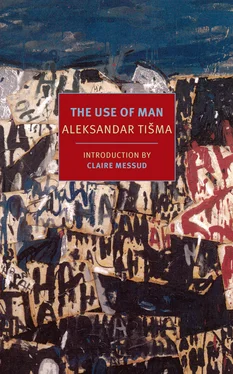Aleksandar Tišma - The Use of Man
Здесь есть возможность читать онлайн «Aleksandar Tišma - The Use of Man» весь текст электронной книги совершенно бесплатно (целиком полную версию без сокращений). В некоторых случаях можно слушать аудио, скачать через торрент в формате fb2 и присутствует краткое содержание. Год выпуска: 2014, Издательство: NYRB Classics, Жанр: Современная проза, на английском языке. Описание произведения, (предисловие) а так же отзывы посетителей доступны на портале библиотеки ЛибКат.
- Название:The Use of Man
- Автор:
- Издательство:NYRB Classics
- Жанр:
- Год:2014
- ISBN:нет данных
- Рейтинг книги:5 / 5. Голосов: 1
-
Избранное:Добавить в избранное
- Отзывы:
-
Ваша оценка:
- 100
- 1
- 2
- 3
- 4
- 5
The Use of Man: краткое содержание, описание и аннотация
Предлагаем к чтению аннотацию, описание, краткое содержание или предисловие (зависит от того, что написал сам автор книги «The Use of Man»). Если вы не нашли необходимую информацию о книге — напишите в комментариях, мы постараемся отыскать её.
A work of stark poetry and illimitable sadness,
is one of the great books of the 20th century.
The Use of Man — читать онлайн бесплатно полную книгу (весь текст) целиком
Ниже представлен текст книги, разбитый по страницам. Система сохранения места последней прочитанной страницы, позволяет с удобством читать онлайн бесплатно книгу «The Use of Man», без необходимости каждый раз заново искать на чём Вы остановились. Поставьте закладку, и сможете в любой момент перейти на страницу, на которой закончили чтение.
Интервал:
Закладка:
They gave him a number of forms to fill out, and he had to be photographed and go out twice for tax stamps, but evidently everything had been arranged beforehand, because after ten days an official letter of acceptance came in the mail, engaging him as a junior clerk with the city police. He arrived for work on the top floor of the building where he had submitted his application. It was a long, bright room, which could easily accommodate a desk for the new arrival, in addition to the desks of the two men already there: Rudi Streuber, a German from the Banat, who was in charge, and Peter Kilipenko, a Russian émigré, who was a clerk. Young, brilliant, but lazy, Streuber gave the orders, and industrious old Kilipenko would hunch over his documents and battered dictionaries. The two were translating from German all the German Command orders for the Southeast and the orders of the German Military Police, and into German the decisions of the city police, which they sent in three copies to the department secretary, who passed them on.
There was not a great deal to do, a few notices and three- or four-page information bulletins a day, a relatively simple job, since the documents contained much the same vocabulary. Kilipenko jealously guarded every paper until he had translated it roughly in his hooked, clear handwriting, and it was left to Sredoje to polish the language and sometimes retype. He spent a good part of the eight-hour day smoking and reading the newspapers, but when he realized that Streuber, himself not overzealous, had no objection if his new assistant, recommended from higher up, disappeared when there was little to do, Sredoje left the office to take walks, the kind of walks he had taken before from home.
In his new circumstances his lust became more deliberate. In place of occasional pocket money he now had a salary, by no means negligible; he was protected by his position, carrying a card complete with photograph; and he also carried in his pocket, out of a kind of bravado, since joining the police, a snub-nosed revolver, which someone had pawned with his father. Only now did Sredoje realize how timid, anxious, and even risky his earlier excursions had been. But that was in the past. He no longer entered taverns with the feeling of committing a crime, but with the confidence of the elite, almost like his heroes, the German soldiers. When he caught himself imitating them, he smiled. It was easy for him now to start conversations with women there, and with some of them he even had amorous encounters. But the constraints and banalities of the main rooms were carried over, however much he tried to avoid it, into the little rooms to which the women took him for their hurried embrace. This ceased to satisfy him. Led by instinct, he ventured farther afield, prowling the town more boldly.
He would follow any unescorted woman who seemed unsure of herself, rejecting her only if she turned her back on him sharply when he accosted her, or if she disappeared into a house where he was not bold enough to go. He explored unfamiliar streets, memorized faces, took note of details. His eye became practiced.
As a diver, after plunging numberless times into the darkness of the deep, finally puts his hand on the iron bar that reveals the position of the sunken ship, so Sredoje, one evening after work, on the street in front of the railroad station, suddenly became aware that the women who appeared to be standing there by chance or walking beside its walls were exactly what he had been imagining in the course of his long search. He looked one of them over; she returned his look. Holding his breath, he approached another, and saw that she, too, had spotted him and made him aware of it by a movement of her shoulders. A number of other men loitered around the street with their coat collars up and their hats pulled down on their heads. One of them exchanged a few words with the first woman, then left her and stood a short way off. Sredoje, as if pulled by a magnet, took the man’s place, mumbled “Good evening,” and the woman, turning to him and pretending surprise, returned his greeting. He asked her where she was going; she said nowhere. He suggested they go for a stroll together; after a careful look around, she agreed. They chatted. The woman said she was thirsty, so they went into a nearby tavern and each had a brandy at the counter. In the light, Sredoje saw that the collar of her coat was worn down to the lining and that her brown hair was greasy, but his eyes were drawn to the wedge of fair skin between her bulging breasts, taut beneath her coat. He asked her abruptly if she needed money, they agreed on a price, and she led him out. They walked some distance, she half a pace in front of him, and then, near the quay, she knocked at the door of a low house, where a stooping old woman in a head scarf rented them a stifling little room.
The novelty of this encounter held so much charm for Sredoje that he went right back again to the street in front of the station. And every day from then on. He went further to the left and to the right, to see how far this hunting ground for women extended. For it was a hunting ground, as opposed to those cages of the taverns, where he had felt almost as trapped as the women there. But here the women came from all directions and of their own free will, like wild animals drawn to a watering hole, and new ones came, some out of poverty, some out of habit, some out of inclination. They were not yet crushed; they still had some pride, and, unlike the tavern girls, no one was their master, their pimp. But also there was no one to protect them. Like game in front of guns in ambush, they exuded that mixture of boldness and fear which excited the hunter. They strutted before the eyes of their enemies and partners in the game, making their inevitable surrender more delightful.
Sredoje now discovered that not only bodies beneath coats and dresses were laid bare, but souls as well. With a hungry passion he questioned the women who risked the street: Where did they come from? For what reason? He observed their fear, a fear equally of punishment and of scandal; he observed the moment when, crossing the threshold of the rented room, they cast off the mask of self-confidence with their clothes, abandoning all resistance, as in ardent love, but without the burden of responsibility that love imposed.
Their very submissiveness was exciting, their trembling setting of limits. As he possessed one after another, Sredoje wondered how far he could go in his amorous demands without meeting a refusal. The police card was burning a hole in his pocket. He toyed with the idea of dumfounding some woman with it, of breaking her down further, to a surrender that was total. For some time he hesitated, knowing full well that it was wrong, illegal, to use it, that he would be plunging into danger, which would result in his fearing as they feared. But he longed for that fear, too, his own, which would add to the excitement.
One evening, when it was snowing, he stopped under a streetlight with a tall, black-haired girl in a thin dark coat. The moment she quoted a price for her services, he pulled out his card, unfolded it, and shoved it before her panic-stricken eyes. “Do you see this? I’m placing you under arrest for prostitution.” He expected an argument, or that she would read the document carefully and say that it did not give him the power to arrest, and he would then try to laugh the whole thing off as a joke.
But, instead, the girl’s thick lips quivered, and tears from her wide eyes made shining streaks down her face. “Don’t do that to me, please! My family would kill me!” And she seized his hands in hers, which were soft and moist.
He pulled his hands away. “Not arrest you? Ha! And what will you do for me if I don’t?”
“Anything. I’ll do anything,” she said, again grabbing his hand, as if she wanted to kiss it, and looking at him with terror in her eyes.
Читать дальшеИнтервал:
Закладка:
Похожие книги на «The Use of Man»
Представляем Вашему вниманию похожие книги на «The Use of Man» списком для выбора. Мы отобрали схожую по названию и смыслу литературу в надежде предоставить читателям больше вариантов отыскать новые, интересные, ещё непрочитанные произведения.
Обсуждение, отзывы о книге «The Use of Man» и просто собственные мнения читателей. Оставьте ваши комментарии, напишите, что Вы думаете о произведении, его смысле или главных героях. Укажите что конкретно понравилось, а что нет, и почему Вы так считаете.












